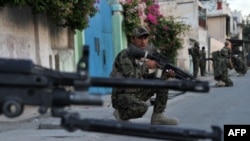BRUSSELS —
The U.S. commander in Afghanistan, General Joseph Dunford, says Taliban insurgents are inflicting heavy losses on Afghan national security forces as the Afghans assume the lead.
U.S. Marine Corps General Joseph Dunford spoke to reporters on the sidelines of a gathering where U.S. Defense Secretary Chuck Hagel joined NATO defense ministers to talk about the way forward in Afghanistan as international forces prepare to draw down next year.
As that drawdown nears, international troops are taking up more of a support role and it is the Afghans who are in the lead against the insurgents. Now on the front lines with international troops only providing backup, the Afghans are at risk for greater losses.
Several weeks into the fighting season, General Dunford said the Taliban has done what it said it would do: step up high-profile assaults and insider attacks to create fear and intimidation.
He called the losses among Afghan forces significant.
“The numbers have been, as I look back over the last six or eight weeks, it's probably been 70 in one week. It was 44, 34 and then the last two weeks have been over 100,” Dunford said.
But Dunford said the Afghan forces are exceeding expectations in their ability to take on the insurgents and he expressed confidence that they are well on their way to being able to defend their country on their own.
The general said the only operations still led by U.S. and other international forces include local security patrols, route clearance, and drawdown operations.
The high number of Afghan casualties is one reason U.S. military officials want to wait before deciding how many foreign troops should remain in Afghanistan to continue training, advising, and assisting the Afghans after most international troops leave at the end of next year.
Dunford said there are a number of things that need to be watched before determining the size of a residual force.
“Certainly, the performance of Afghans this summer. The results of elections in 2014. Any political processes that may bring the Taliban into a political process will have an effect on that which obviously affects the strength of the insurgency so I think it's impossible today except with the linear progression to project out to 2015 what the security environment is going to be,” Dunford said.
U.S. military officials on Tuesday said they are not especially concerned about talks that the Taliban has been holding with Iran, which analysts believe is looking to exert influence on Afghanistan once most international troops depart next year.
Brussels is the final stop on a round-the-world trip on which Defense Secretary Hagel is calling attention to threats in cyberspace, which is the focus of a special session at the NATO meeting.
The defense secretary also used the Brussels visit to reassure NATO partners that Washington is able to meet its commitments to the alliance, despite Washington's budget problems. He offered similar reassurances to the U.S.' Asian partners during his previous stop at the Shangri-La dialogue, an annual Asia-Pacific security summit in Singapore.
U.S. Marine Corps General Joseph Dunford spoke to reporters on the sidelines of a gathering where U.S. Defense Secretary Chuck Hagel joined NATO defense ministers to talk about the way forward in Afghanistan as international forces prepare to draw down next year.
As that drawdown nears, international troops are taking up more of a support role and it is the Afghans who are in the lead against the insurgents. Now on the front lines with international troops only providing backup, the Afghans are at risk for greater losses.
Several weeks into the fighting season, General Dunford said the Taliban has done what it said it would do: step up high-profile assaults and insider attacks to create fear and intimidation.
He called the losses among Afghan forces significant.
“The numbers have been, as I look back over the last six or eight weeks, it's probably been 70 in one week. It was 44, 34 and then the last two weeks have been over 100,” Dunford said.
But Dunford said the Afghan forces are exceeding expectations in their ability to take on the insurgents and he expressed confidence that they are well on their way to being able to defend their country on their own.
The general said the only operations still led by U.S. and other international forces include local security patrols, route clearance, and drawdown operations.
The high number of Afghan casualties is one reason U.S. military officials want to wait before deciding how many foreign troops should remain in Afghanistan to continue training, advising, and assisting the Afghans after most international troops leave at the end of next year.
Dunford said there are a number of things that need to be watched before determining the size of a residual force.
“Certainly, the performance of Afghans this summer. The results of elections in 2014. Any political processes that may bring the Taliban into a political process will have an effect on that which obviously affects the strength of the insurgency so I think it's impossible today except with the linear progression to project out to 2015 what the security environment is going to be,” Dunford said.
U.S. military officials on Tuesday said they are not especially concerned about talks that the Taliban has been holding with Iran, which analysts believe is looking to exert influence on Afghanistan once most international troops depart next year.
Brussels is the final stop on a round-the-world trip on which Defense Secretary Hagel is calling attention to threats in cyberspace, which is the focus of a special session at the NATO meeting.
The defense secretary also used the Brussels visit to reassure NATO partners that Washington is able to meet its commitments to the alliance, despite Washington's budget problems. He offered similar reassurances to the U.S.' Asian partners during his previous stop at the Shangri-La dialogue, an annual Asia-Pacific security summit in Singapore.




